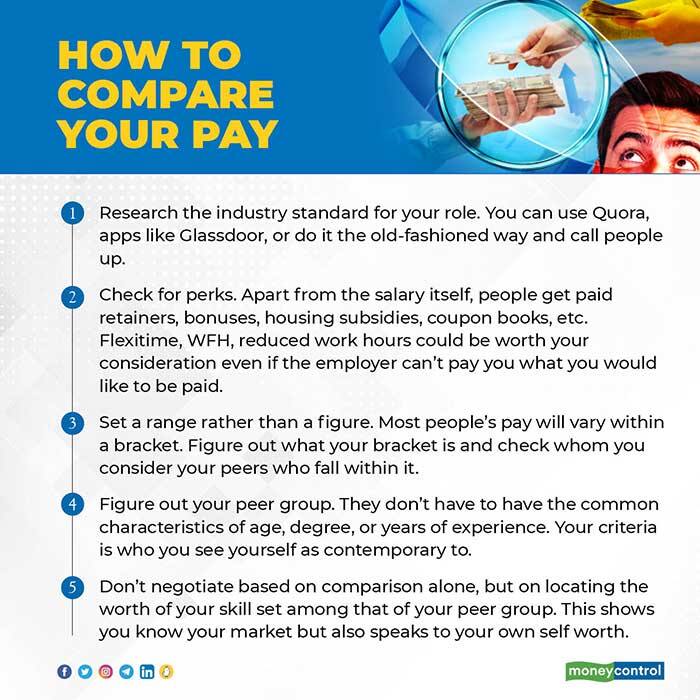



Note to readers: Healing Space is a weekly series that helps you dive into your mental health and take charge of your wellbeing through practical DIY self-care methods.
On January 30, 2022, when TV writer Kevin Dooley pointed out on Twitter that when someone he knew bragged about undercutting a single mom for her fee by around $80,000 a year, he pointed it out to the single mom and she was able to find another, more fairly compensated job.
 Others noted that employers who had been compassionate in their use of power had used their positions to pay joining employees what they were worth, rather than what they thought they could get.
Others noted that employers who had been compassionate in their use of power had used their positions to pay joining employees what they were worth, rather than what they thought they could get.
Not all of us make a sound judgement when we evaluate what we are worth in a job market. Some of us evaluate our skills too poorly and ask for less, while others become overconfident about skill sets and set expectations too high.
Most of the time we just take what we can get, but this leaves us looking or intending to look for another job in the meanwhile. Employers who pay people what their skills are worth, instead of undercutting them, are not only more likely to retain employees, but win their loyalty and raise job satisfaction. Thus, it is important not only to know our skill sets but to feel fairly compensated in comparison to others performing the same role.
The theory of comparing our compensation is called Social Comparison. We are not only concerned with what we make but what our peers make. When we notice unfair gaps in salary, we can lose motivation and even sabotage our work, leaving those we perceive as the better-paid employees to pick up the slack. The exception can be where the work is meaningful to us, so we accept a lower pay in return for the emotional satisfaction that we feel.
Should we compare our salaries? Well, whether or not we should, we are likely to. JS Adam’s seminal 1965 essay on equity theory outlined that we undertake cognitive processes in making comparisons; relative deprivation and relative gratification.
All our sense of dissatisfaction, loss of motivation, and low morale come from perceiving ourselves as having suffered injustice. Here's the thing, though, research finds we don’t always compare our salaries to the person most realistically like us in terms of experience or work profile, we tend to compare ourselves to the highest-paid person in our field, i.e., those we would most aspire to be like. We gain the most satisfaction when our pay, raise or bonus allows us to rank ourselves in that hierarchy. So, if you got the same pay rise as everyone else, you might be okay with it, but if you got an amount that ranked you as higher than others, you would be happy with it. Our relative incomes, i.e., what we have in comparison to others, is a huge determinant of our happiness. This is because it is not only about the money we are getting, but where we are located in the social hierarchy.
However, we tend to make comparisons on surface values. For instance, that manager drives a top-end car while another takes the train; one wears a branded shirt, the other unbranded clothes. We base our dissatisfactions on superficial evidence. In doing so, we overlook perks of the job, growth opportunities, and also personal factors, such as individual personality, tastes, debt, credit burdens and asset liabilities, and the role of privilege, intergenerational wealth.
Organisations tend to pay more for professional degrees from top institutes. So in the larger bracket, we are competing with not just the work done per workday, targets met, but the broader priorities the organisation puts down. Tesla, for instance, has a stated policy of not concerning themselves overtly with degrees, but others do.
Also read: Do Tesla employees make more than their other EV industry counterparts?
According to a Pew research study, women continued to earn 84% of what men earned in the 2020s in the US. Globally, women's pay gap is 77%, according to the UN. Comparison of median pay allows us to witness the fairness of our workplaces and their positions in real-time on gender equality and diversity. In the end, we are more likely to be happy with a workplace that offers us fair pay with respect to our colleagues and social ranking, than a workplace that offers us higher pay but where we are placed more lowly than our peers.

Discover the latest Business News, Sensex, and Nifty updates. Obtain Personal Finance insights, tax queries, and expert opinions on Moneycontrol or download the Moneycontrol App to stay updated!
Find the best of Al News in one place, specially curated for you every weekend.
Stay on top of the latest tech trends and biggest startup news.